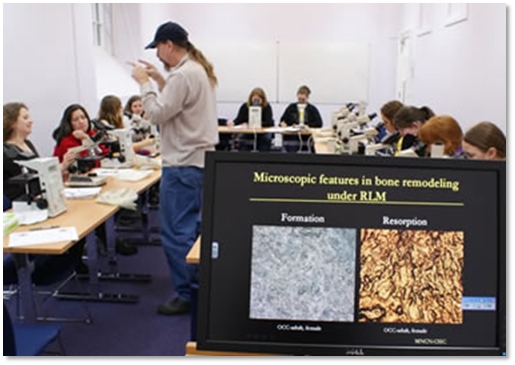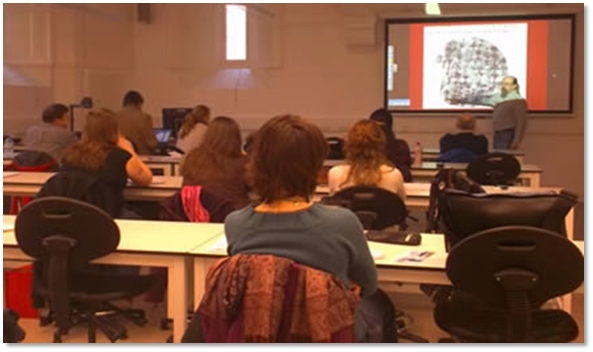Anthropology Connection in Scotland

On March 1-2, 2012 , Professor Robert R. Paine from the Department of Sociology, Anthropology and Social Work, Texas Tech University held a forensic anthropology workshop at the University of Edinburgh, Edinburgh, Scotland. Dr. Paine was invited as the featured speaker for the workshop and he provided five lectures ranging in topics from animal histology, identification of human remains, to age-at-death assessment methods used in forensic cases. Each lecture was followed by hands-on learning and reading experience using light microscopes to examine bone microanatomy.
The workshop was hosted by Dr. Elena. Kranioti from the School of History, Classics and Archaeology. The aim of the forensic workshop was to initiate an intensive course on skeletal histological methods and their applications in forensic anthropology and human skeletal biology. The first workshop was held last year and it was funded by the University of Edinburgh Campaign. This past year the School of History, Classics and Archaeology funded the workshop.
This year's workshop focused specifically on an international teaching initiative welcoming professionals from several UK and EU institutions. So far, 45 individuals have participated in this educational experience, with some of the attendees having come from Spain, The Netherlands, Ireland, and Germany. The objective of the workshop was to provide information on the theoretical background of bone histology and specific data that can be gained from histological cross-sectional and surface histology that then can be applied to research questions in the fields of Forensic Anthropology, Osteoarchaeology, Skeletal Growth and Human Evolution. The participants were taught basic principles of bone biology, histology and microanatomy, cellular structure, bone formation and repair. Specific lectures and lab training were designed to explore the effects of age and diet in the formation of bone remodelling of micro-anatomical features.

Participants were enthusiastic about the workshop. They found it to be a brilliant initiative and a useful addition that broadened their horizons about the research potential in their individual disciplines.
The forensic histological workshop has attracted the interest of several current and former students, resulting in the development of several graduate students' projects on thin section bone histology. "The preparation of bone thin sections in archaeology started only a few weeks ago, but we are proud to say that we have already achieved a thin section of Neanderthal bone from the archaeological site of El Sidron, Spain," Paine said.
Dr. Paine and Dr. Kranioti have been working together for several years. As a result
of their collaboration they have published a review of the state of forensic anthropology
in Europe (Forensic Anthropology in Europe: An Assessment of the Current Status and
Application. The Journal of Anthropological Sciences. Vol 89:71-92.
Recently, they have established the first forensic histology lab in the UK at the
University of Edinburgh. This facility will be used to help with assessing forensic cases and to educate future
students of forensic anthropology. Dr Paine is a forensic anthropologist in the
Department of Sociology, Anthropology and Social Work, TTU. He has worked on forensic
cases in the west Texas area for the last 18 years. Dr. Kranioti has a Ph.D. in
forensic anthropology and she is trained as an MD in forensic pathology. She has
been teaching at the University of Edinburgh, Scotland for two years.
College of Arts & Sciences
-
Address
Texas Tech University, Box 41034, Lubbock, TX 79409-1034 -
Phone
806.742.3831 -
Email
arts-and-sciences@ttu.edu
